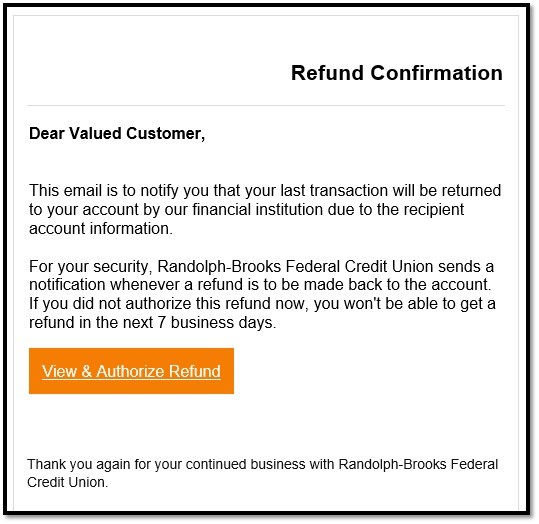Phishing Alert: RBFCU Warns of Attempted Email Scams Targeting Members and Nonmembers
LIVE OAK, Texas (Oct. 10, 2025) — RBFCU IT Security and Fraud teams have observed an increase in phishing emails and other activities aimed at compromising members’ accounts. These third-party emails attempt to obtain personal information through fraudulent messages and websites mimicking RBFCU.
RBFCU asks all members to be vigilant with their account information. RBFCU and RBFCU employees will never initiate a phone call, email or text message to anyone — members or non-members — asking for your sign-in information, including usernames, passwords, security questions and answers, multifactor authentication (MFA) codes, MFA recovery codes and one-time passcodes (OTP), or other personal information, like account, credit card, debit card or Social Security numbers. Also, RBFCU employees will never need to sign in to your Online Banking account on your behalf. If someone contacts you claiming to be an RBFCU employee and asks you to approve a sign-in request for them, do not respond.
If you receive a suspicious phone call, email or text message, hang up, do not respond to the message, do not click any links, and do not open any attachments. Forward any suspicious emails and text message screenshots to abuse@rbfcu.org, then delete the message. If you believe your account, username or password has been compromised, you should immediately contact RBFCU at 210-945-3300 for assistance. Additionally, members should monitor their accounts regularly and report any suspicious transactions.
What Is Phishing?
According to the Federal Trade Commission (FTC), phishing is when:
• You get emails, texts or calls that seem to be from companies you know or trust (your financial institution, an online store, etc.), but they’re actually from scammers.
• You’re encouraged to click on a link and give personal information (like a password) so that they can steal your money, identity or gain access to your computer. The link (or verbal request for information) often looks legitimate or convincing and may deal with invoices, payments, government refunds, coupons, etc.
Learn more about how to recognize phishing and protect yourself from it.
Below is an example of a phishing email:
